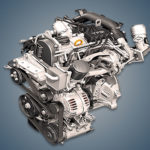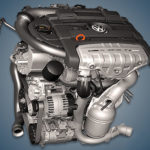The 2.5-liter Volkswagen BGP injection engine was produced from 2005 to 2010 and was installed on such popular concern models as the Golf or Jetta for the US market. There were several analogues of this motor at once under other indices BGQ, BPR and BPS.
The EA855 series includes: BGP, CBTA, CEPA, CTSA, DAZA, DNWA.
Specifications
| Production years | 2005-2010 |
| Displacement, cc | 2480 |
| Fuel system | injector |
| Power output, hp | 150 |
| Torque output, Nm | 228 |
| Cylinder block | cast iron R5 |
| Block head | aluminum 20v |
| Cylinder bore, mm | 82.5 |
| Piston stroke, mm | 92.8 |
| Compression ratio | 10.0 |
| Features | no |
| Hydraulic lifters | yes |
| Timing drive | chain |
| Phase regulator | on the intake shaft |
| Turbocharging | no |
| Recommended engine oil | 5W-30 |
| Engine oil capacity, liter | 5.7 |
| Fuel type | petrol |
| Euro standards | EURO 4 |
| Fuel consumption, L/100 km (for VW Jetta 2006) — city — highway — combined |
11.2 8.1 9.3 |
| Engine lifespan, km | ~330 000 |
The engine was installed on:
- Volkswagen Beetle 1 (9C) in 2006 – 2010;
- Volkswagen Golf 5 (1K) in 2006 – 2008;
- Volkswagen Jetta 5 (1K) in 2005 – 2008.
Disadvantages of the VW BGP engine
- The first years of production, these units suffered from very rapid stretching of the timing chain.
- The culprit for traction failures is most often the fuel pump or its clogged filter.
- Relatively short service life of ignition coils, up to 100,000 km a pump can leak.
- Electrically, the coolant temperature sensor often fails.
- Also, owners of cars with such an engine often complain about oil and antifreeze leaks.






